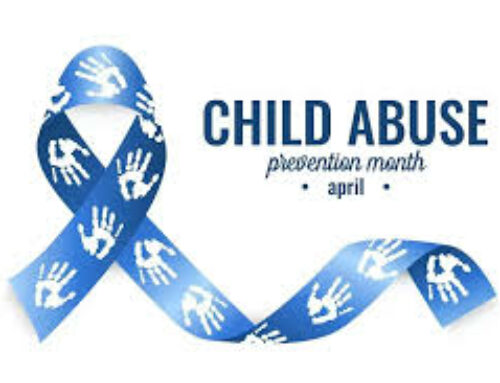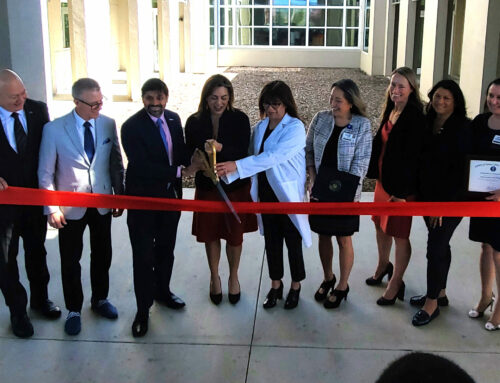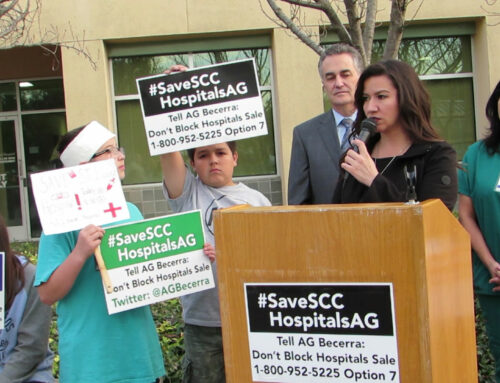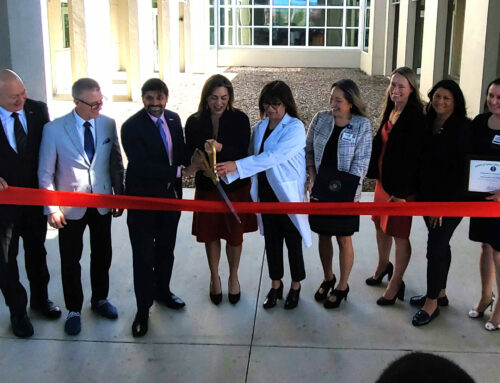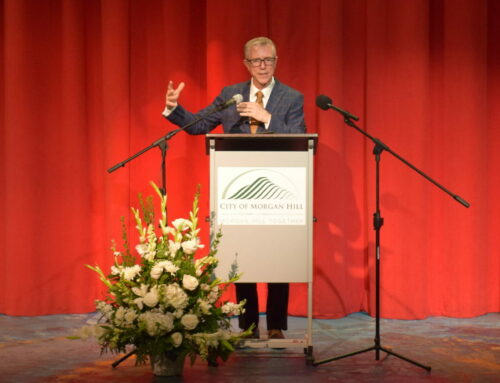For Martha McNiel, operating DreamPower Horsemanship gives her more than she could have ever envisioned.
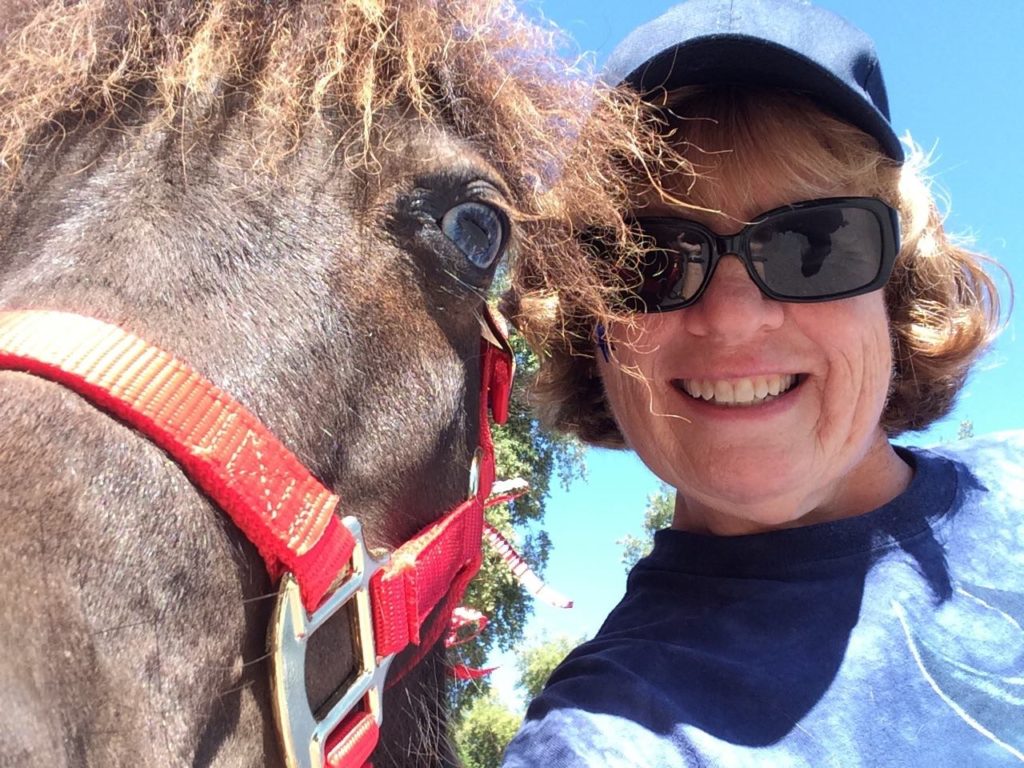
Photo courtesy Martha McNiel Martha McNiel and her horse Sweet Pea.
By Kelly Barbazette
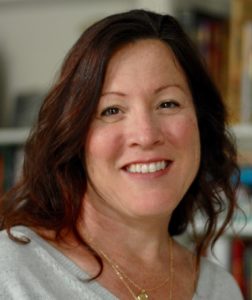
Kelly Barbazette
Martha McNiel combines her love of horseback riding with therapy to empower South Valley people who have experienced a trauma or live with a neurological condition.
I recently had the pleasure of chatting with the licensed marriage and family therapist about her role as the director of DreamPower Horsemanship. She founded the nonprofit in 2002 in Gilroy to provide equine-assisted activities and therapies for hundreds of community members and their families.
A self-proclaimed born horse lover, Martha, 60, said she has loved horseback riding since she was a child. However, her dad, who was a pediatrician, discouraged her from owning a horse.
“When I turned 40, I thought if you’re ever going to get a horse now’s the time and that was 20 years ago,” she said.
At that time, in the early ‘90s, she was working for the city and county of San Francisco as a psychotherapist. She worked with many children who lived in foster care. As she watched them in her office, she said she kept thinking how much better it would be if she could treat them outdoors at her ranch. While working on her doctoral dissertation, she discovered that people all over the world were doing equine-assisted therapy.
 “The chair of my doctoral dissertation committee laughed and said no one would take it seriously,” she said.
“The chair of my doctoral dissertation committee laughed and said no one would take it seriously,” she said.
And then 9/11 happened. At that time, Martha was commuting to work, driving back and forth across the Golden Gate Bridge. Tanks and soldiers with machine guns stood guard, believing the bridge could be a target for another attack.
She feared that at any time her life could end from another attack. She imagined God asking her if she understood what her life’s work had been and she responded she had intended to open an equine-assisted therapy program, but she didn’t have the money or time to make it a reality.
“That seemed like a weak conversation to happen,” she said. “After 9/11, I thought either do it or stop talking about it.”
 A few months later, Martha moved to San Martin. She began treating her first client, a young man with autism, in August 2002 and started offering equine-assisted therapy with the help of her Arabian horse and a miniature horse. Martha had hoped to focus on helping children in foster care and group homes, but there wasn’t enough funding in the county and state budgets to allow that. So she expanded services to a wider demographic of patients.
A few months later, Martha moved to San Martin. She began treating her first client, a young man with autism, in August 2002 and started offering equine-assisted therapy with the help of her Arabian horse and a miniature horse. Martha had hoped to focus on helping children in foster care and group homes, but there wasn’t enough funding in the county and state budgets to allow that. So she expanded services to a wider demographic of patients.
Equine-assisted therapy offers a psychological framework to guide decision-making, she said. Martha and her team of therapists mostly work with people who have experienced trauma. They work on recognizing triggers and teaching self-soothing techniques, including learning to calm down a horse while simultaneously calming themselves down.
“Rather than talk to patients about what happened last week, we actually see it in front of us and work with it in the moment,” she said.
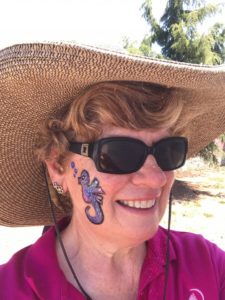 For Martha, operating DreamPower Horsemanship gives her more than she could have ever envisioned.
For Martha, operating DreamPower Horsemanship gives her more than she could have ever envisioned.
“I love helping people, so it’s very satisfying when we’re able to help someone, to feel better, to recover a part of their lives, improve an area of their life,” she said. “It’s been extremely satisfying for me. I love veterans and working with police officers and first responders. I’ve never felt more satisfied helping people than during COVID. We’re helping people who weren’t getting help anywhere else. It’s necessary and important.”
DreamPower employs one psychologist, three licensed marriage and family therapists, and five associate marriage and family therapists. Patients and their therapists work with 19 riding and driving horses, including a mule, and five miniature horses including a donkey. In addition, five horses are trained to pull a carriage.
In 2019, DreamPower served 835 participants with the help of more than 500 volunteers. Currently, carriage riding and therapeutic riding aren’t offered due to COVID-19 restrictions. Instead, therapists and patients focus on unmounted work with the horses as well as individual and group sessions outside with social distancing.
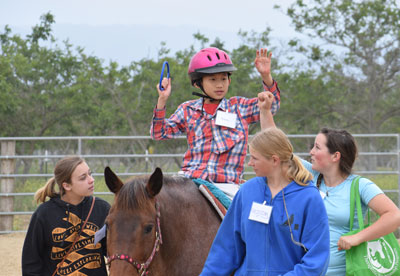
Photo by Robert Airoldi Instructor Seldy Nelson (hand in the air), handler Christina Bless (blue sweatshirt) and Cassidy Andrews from South Valley Community Church Youth Group work with Roland Chiang, 11, riding Holly.
Additionally, many patients continue to meet with their therapists virtually. The ranch in Gilroy is a busy place — offering daily individual and group therapy sessions for military veterans, first responders, children with autism, children of police officers, and senior citizens suffering from dementia.
Martha said they have seen the most growth in therapy sessions for first responders. She said they are less likely to reach out for help but need support now more than ever.
“People are committing suicide and our goal is to prevent that. People who have support are less likely to commit suicide,” she said. “The need and value became so apparent and clear during COVID.”
Future goals for DreamPower Horsemanship include building a new website and an expansion of its vaulting for mental health program. Interactive vaulting therapy combines basic gymnastics on horseback with psychotherapy. Martha said she hopes to become certified as a Professional Association of Therapeutic Horsemanship International Interactive Vaulting instructor.
Martha doesn’t have any plans to retire in the foreseeable future, adding, “I love what I do.” When she’s not working, she enjoys playing with the horses and her two certified therapy dogs, a German Shepard and a Border Collie, and talking walks.
When asked what advice she’d offer women pursuing their goals, she said no one does anything great on their own. Not waiting for others to do something for you while also accepting help is key.
“I think it’s a balance between don’t depend on anyone else to do it for you and gather as many good people around as you can and let them help you,” she said.
She said DreamPower only exists because of all of their wonderful volunteers.
“We have some of the finest people on the planet helping us,” she said.
DreamPower welcomes new volunteers with various skill sets, including gardening, interpersonal skills, creating a website, fundraising, and riding horses. There’s a new volunteer orientation program monthly.
For more information about DreamPower Horsemanship, visit its Facebook page at www.facebook.com/DreamPowerHorsemanship.
Kelly Barbazette, a former journalist for Bay Area newspapers, is a freelance writer. She lives in Gilroy with her husband and two daughters. She can be reached at [email protected].


